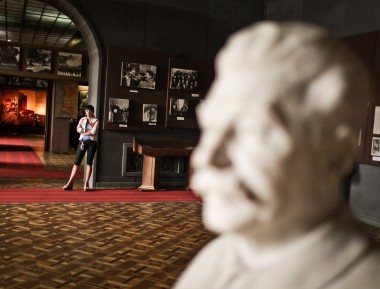Tag: Radio programs
WXXI broadens reach in seven-year partnership with commercial FM
WXXI and WDKX in Rochester, N.Y., are very different stations serving very different audiences — and that’s a big reason that their ...Thinking inside the bubble: KCRW’s Sonic Trace explores roots of L.A. Latinos
Sonic Trace seeks to record stories from southern California’s Latino immigrant communities, documenting the many and varied paths they take to get ...Wait, Wait … Don’t Tell Me! beams into movie theaters May 2 for a live event
The latest public radio program to experiment with the big screen, NPR's fun-loving news quiz show Wait, Wait . . . Don't Tell Me! ...Jesse Thorn’s Bullseye moving to NPR
More than six weeks after first announcing his arts-and-culture radio program's exit from longtime distributor PRI, Jesse Thorn revealed the details of ...WXXI reporter’s trip builds bridge between Rochester and South Sudan
The educational system in the newly independent South Sudan is undergoing many changes, and WXXI’s Hélène Biandudi recently reported on them firsthand ...WXXI and Rochester Museum promote dialogue on race
WXXI in Rochester, N.Y., is teaming up with a local museum to encourage a community dialogue on race relations. The Rochester Museum & ...PRX brings ‘mood ring’ of Eastern Europe’s millennial generation to public radio
With Generation Putin: Young People and Change in the Former Soviet Union, a new hourlong public radio special, Public Radio Exchange and producers from ...PRX set to launch overhaul of Public Radio Player iPhone app
Four years after the first iteration of PRX’s Public Radio Player iPhone launched, a complete, “ground-up rewrite” is ready, with features including ...Mullins exits The World as Werman steps up as full-time host
Dec. 31, 2012, marked the last day that Lisa Mullins, longtime host of PRI’s The World, held that position. On Jan. 1, reporter and ...Jesse Thorn: Bullseye will stay on public radio after leaving PRI
Bullseye with Jesse Thorn will continue to be heard over broadcast radio after the show has left distributor PRI in spring 2013, host and ...Transom aids producers with Donor Fund gifts
Transom.org has awarded small radio production grants from its Donor Fund. The online watering hole and how-to site for radio producers provided grants ...Big oil, big changes spotlighted in Black Gold Boom
From roughnecks to singing cowboys and itinerant knife dealers, North Dakota’s oil boom has lured thousands to remote areas of the state ...Ideastream recognizes WCLV’s Robert Conrad for ‘innovative and generous acts.’
Conrad, president and co-founder of the 50-year-old Cleveland-based classical music station, received ideastream’s “Great Idea Award” for his service as a leading ...Deal resolves ownership of Ohio’s WYSO-FM as the college that built it revives
Two years after Antioch College reopened its campus in Yellow Springs, Ohio, it negotiated an $8 million deal to buy back WYSO, NPR News ...BURN: An Energy Journal wins AAAS Kavli Science Journalism Award
The American Association for the Advancement of Science singled out the first of four BURN documentary specials, “Particles: Nuclear Power After Fukushima,” which ...









